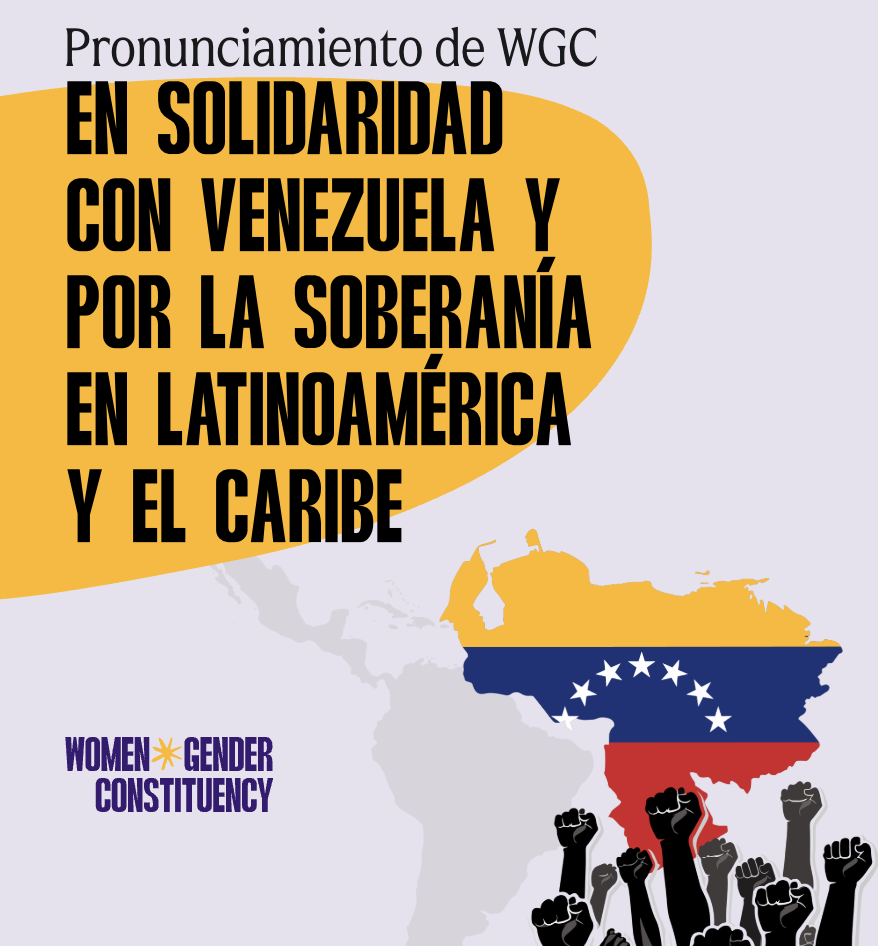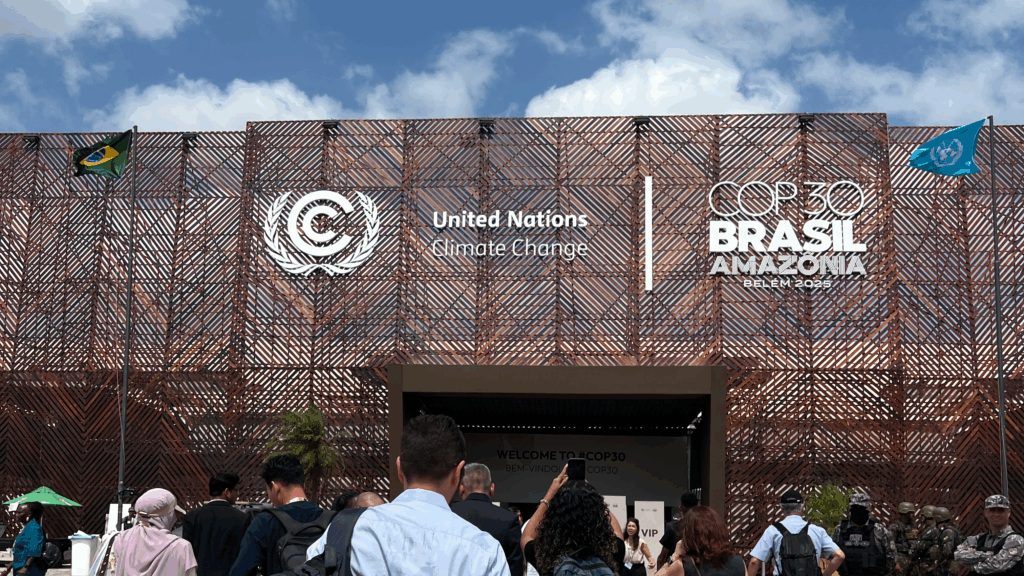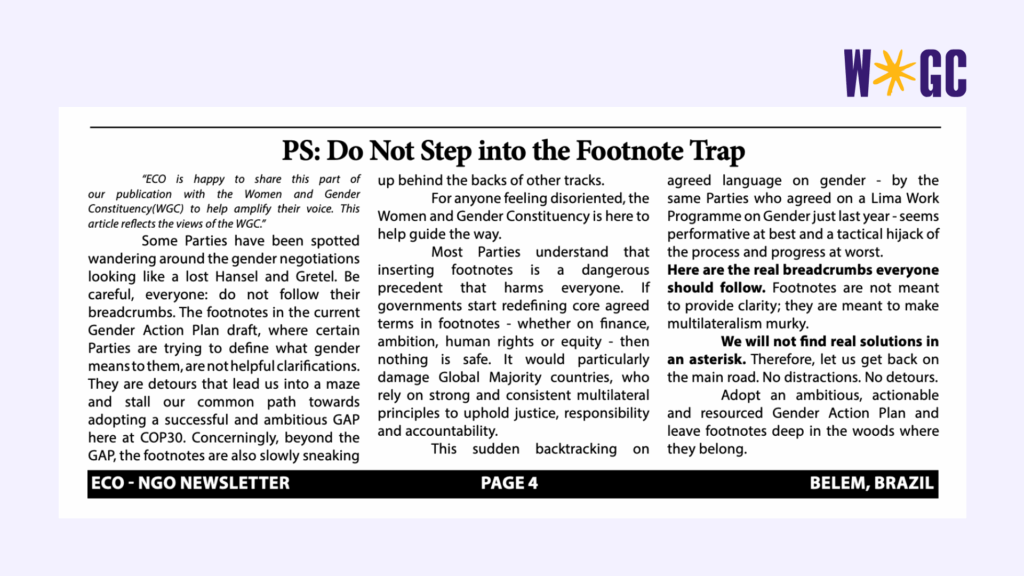
This is Not the Time for Distractions: It Is the Time for Action

WGC Statement on the State of Gender Negotiations
For immediate release | Bonn Climate Conference, Germany
Claudia Rubio: claudia@wedo.org (WGC Gender Working Group Lead)
Zukiswa White, zukiswa@womengenderclimate.org | +27 812109607 (WGC Coordinator)
As millions of people continue to experience the extreme impacts of the climate emergency, the majority of them being women and marginalized communities, the first week of SB60 has ended without any significant progress in renewing the work programme on gender and its action plan. With SB60 set to close on June 13th, parties now have just four days to define and shape the climate future of more than half of the world’s population.
After five years of implementing the Enhanced Lima Work Programme on Gender, parties spent the first three days of SB60 at the “In-Session Workshop on Progress, Challenges, Gaps, and Priorities in Implementing the Gender Action Plan and on Future Work to Be Undertaken on Gender and Climate Change.” We expected parties to dive right into consultations and negotiations for the new work programme. However, it is deeply concerning to witness slow progress on the actual work, while energy and time are being diverted to technical distractions that erode the trust necessary for an ambitious gender work programme and its action plan to be decided at COP29.
The Women and Gender Constituency (WGC) wishes to remind parties that they have four days left at SB60. A lack of meaningful and tangible progress by the end of SB60 would eliminate any possibility of making a decision during COP29. The decision we expect must be ambitious and transformative, which requires time, dedicated capacities, collaborative efforts, and trust among negotiating parties. The WGC urges parties, as they start the second and final week of SB60, to focus on the work and, at the very least, agree on the work programme on gender.
We call on all parties to rise to this critical occasion, ensuring that the work programme on gender is not just renewed but strengthened, reflecting our collective commitment to gender equality and the rights of millions of women and marginalized communities facing the brunt of the climate crisis.
Quotes from members of the WGC
“It’s troubling that over the years, there have been very few hours or sessions dedicated to gender negotiations. Even this year, when reviewing the gender action plan is crucial, gender advocates still have to plead for more time to discuss gender on the agenda. This is not the case for other thematic tracks, such as finance. Gender issues are not trivial—women, girls, and gender minorities suffer climate change impacts and despite being often excluded from meaningful engagement in climate solutions, they champion climate actions. Gender should not be an afterthought, gender should not be sidelined. We urge parties and the secretariat to prioritise the gender agenda!” – Zainab Yunusa, WGC (Nigeria)
“After months of work and planning, we came to Bonn with limited resources, holding the noble expectation of working together towards a strengthened LWP and a renewed GAP that is transformative and intersectional. We look forward to continuing collaborating with all parties to make this a reality. Do not let this hope die down!” – Diego de León, OutForSustainability
“Having a strong renewed Lima Work Programme and Gender Action Plan will help define the future of gender within climate action. For years, our work has helped execute the mandate found within this Work Programme, and we believe that Parties can create an even stronger iteration that will enhance action at this nexus, making sure that the disproportional climate impacts on women, girls and gender diverse people are fully visible and considered. Do not let us down. We are watching!” – Claudia Rubio, Women’s Environment and Development Organization
“This year we are expecting parties to agree on a new LWP and GAP. Globally, women and other structurally excluded groups are struggling from the devastating effects of the climate crisis. We therefore urge parties to come together and find common grounds for an ambitious LWP during SB60.” – Lisbet Dinsen, Danish Family Planning Association.
“We cannot afford to leave Bonn without concrete and ambitious text on gender, so we implore and remind Member States and negotiating parties that we are here to represent the lives, economies and priorities of communities at the frontline of climate change. Going forward parties negotiating gender should be precise , efficient in ensuring progressive text and accelerate the contributions and make the most of lost time without fail, otherwise it is downright unacceptable and shameful to undermine any negotiations on gender. This is our year and we need that decision.” – Memory Kachambwa, African Women’s Development and Communication Network (FEMNET)
“After years of limited progress on gender-responsive climate action, we are counting on parties to agree on an ambitious LWP and GAP in 2024. This move should push gender equality within the UNFCCC, drive policies to end climate and gender injustices, and provide support for national implementation. The lack of progress at SB60 is concerning—it’s time for parties to step up their efforts.” – Rosa van Driel, CARE Netherlands.
“It is a crucial moment in time to ensure that no one is left behind in the climate crisis. The LWP and GAP are an important vessel for ensuring that women and marginalized communities are not left out of the discussion or solution. We urge parties to seize the opportunity to stand next to those bearing the brunt of the climate crisis by working collaboratively towards a strong LWP and GAP.” – Rebecca Heuvelmans, Women Engage for a Common Future (WECF)
“The success of SB60 will hinge on how the people most vulnerable to climate change are safeguarded, their rights protected and their needs addressed. This can only be realized by prioritizing consultation and negotiation of the new work program on Gender and the GAP, to ensure a transformative decision at COP29! The eyes of the people are on you to make it happen!” – Gertrude Kabusimbi Kenyangi, Member of the forest dependent Indigenous People and Local Communities in Uganda

